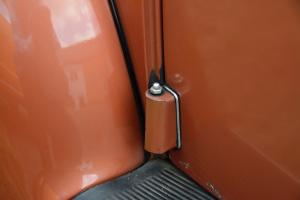How and Why Should You Lubricate Your Car Door locks?
If you are already dealing with annoying squeaking sounds every time you open your car’s doors, fuel filler cap, or trunk, or you are trying to prevent this type of problem from reoccurring, you have reached the right page. Our professional locksmiths have compiled a brief and comprehensive guide on everything you need to know about how, when, and why to lubricate your car door locks, hinges, and latches. Without further ado, let’s get started.
Why Is It Important to Lubricate Your Car Door Locks?
Most car owners do not spend a lot of time thinking about the locks on their vehicles’ doors until their mechanism breaks or a key gets stuck and prevents them from entering. To most people, squeaking and groaning sounds heard when opening or closing doors, gas tanks, or trunks may not be as annoying as a physical malfunction stopping them from properly securing their cars. Accordingly, they tend to completely disregard or temporarily ignore these problems until it is too late and their rusted car door hinges or door latches stop working one after another.
Nonetheless, besides helping owners once again enjoy the new-car feeling and sounds that have faded in time, proper techniques attract additional benefits:
-
They effectively keep dust and dirt build-up from forming inside the locks and their mechanisms
-
They prevent lock malfunction over time
-
They save money, time, and energy on fixing stuck or faulty locks
-
They prevent keys from accidentally breaking inside the locks
-
They expand the lifespan of lock mechanisms and keys
-
They guarantee the locks will keep working effectively and smoothly
What Is the Best Lubricant for Car Locks?
For starters, keep in mind it is essential to select the most suitable type of lubricant for your exact needs, or else you will risk causing more harm than good.
Silicone car door lock lubricant
As a general rule of thumb, the best way to lubricate a car door lock is with the help of silicone-based lubricant. This is due to the barrier they form against water which does a good job at preventing moisture along with dirt and dust from entering the locks.
Silicon lock lubricant is also resistant to very high temperatures during the hot season. This means you can expect it not to rapidly evaporate. Plus, the same lubricant is suitable for use on vehicles that are frequently exposed to the elements in all seasons, preventing the metal from corroding which can be the case with other lubricants.
Silicone-based lubricant for locks does not contain any toxic chemicals, which means it is good for both the environment and your health. and environmentally friendly.
White lithium grease
Another good lubricant for locks that we recommend for your car is white lithium grease. This option is suitable for metal-to-metal joints including hinges and latches that usually require a type of clinging grease that repels water while withstanding harsh weather conditions.
WD-40
WD-40 is suitable for lighter lubrication requirements. If you are looking to free up any partially rusted or sticking catches and hinges, give it a try.
Graphite lubricant
Graphite lubricant is also a good alternative for locks due to its dirt-repellant properties suitable for fine lock mechanisms.
How Often Should You Lubricate Your Car Door Locks?
Since lock, hinge, and latch lubrication is s process that doe snot take more than 10 minutes, some car owners might feel inclined to use it as often as they can remember to prevent future problems.
Nonetheless, our pros recommend you the standard twice-a-year lubrication method. During the summer, the accumulation of dust and dirt combined with high humidity levels could easily generate problems with your locks. During the cold season, snow and ice can quickly lead to build-up on the locks, preventing you from easily opening them, especially early in the morning or late at night when the temperatures are known to drop the most.
Lubricate the car door locks once in the summer and once in the winter for proper maintenance. For the best results, make sure that you first remove any traces of dried-up oil, dust, and grime to help the fresh layer of lubricant to stick to the metal and start working. To clean the locks, you can either use a small wire brush, a toothbrush, or a Q-tip that can reach crevices and areas that are harder to access.
How Often Do You Lubricate Car Door Hinges?
If you can hear your car doors squeaking whenever you open them, the hinges might be affected by corrosion. If this is the case, you can lightly squirt them using WD-40 to free them. Move the doors back and forth a few times to help the lubricant work. Next, squirt some white lithium grease on them or opt for motor oil as an alternative, then operate the door a few times several and make sure to wipe away all the excess product.
You should also inspect the door catch for signs of corrosion. If you own a car with nonmetallic composite mechanisms, you can use a shot of silicone spray for lubrication. For maintenance purposes, lubricate door hinges once or twice a year.
Should Vehicle Door Locks Be Oiled?
If your exterior locks rarely get used, they are more prone to build up dirt and moisture that will prevent them from turning effortlessly, especially in subfreezing temperatures. In general, we recommend using graphite powder lubricant for car door locks due to its anti-dirt properties. As opposed to oil, this type of lubricant will not attract dirt into the fine lock mechanisms.
It is important to periodically lubricate your car door locks, hinges, and latches using the right type of lubricant to prevent annoying squeaking sounds and mechanical malfunction. If you need urgent broken or jammed lock repair services, give us a call now.
